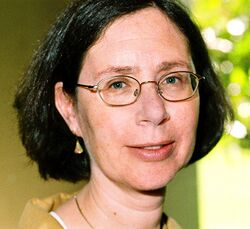Susan Eisenbach
Topic: Biography
 From HandWiki - Reading time: 4 min
From HandWiki - Reading time: 4 min
Susan Eisenbach | |
|---|---|
 | |
| Alma mater | Vassar College |
| Scientific career | |
| Fields | Programming languages Concurrency Testing Verification Smart contracts[1] |
| Institutions | Imperial College London |
| Doctoral students | Diomidis Spinellis[2][3] |
| Website | www |
Susan Eisenbach is an Emeritus Professor of Computer Science at Imperial College London. Her research investigates techniques for producing good software systems that behave appropriately.[4][1]
Education
Eisenbach completed an undergraduate degree in Mathematics at Vassar College.[5] She completed a masters degree in Mathematical Logic and in Computer Science at the University of London, before working as a school maths teacher.[5]
Career and research
Eisenbach joined the Department of Computing, Imperial College London in September 1983. In 1994 she was appointed Director of Studies, a role she held for 15 years, with overall responsibility for teaching.[6] She took a college wide role as Dean of Teaching and Learning in 2010.[7] In January 2011 she was made Head of the Department of Computing, which she completed September 2016.[8] Currently[when?] she is the elected member on College Council. She has supervised numerous PhD students including Diomidis Spinellis[3] and others.[2][9]
She has published several books on programming. In 1981 she published PASCAL for Programmers.[10] She published Program Design With Modula-2 in 1989.[11] She published Reasoned Programming in 1994.[12] Eisenbach's research focuses on how to produce concurrent programs that behave properly.[13][4][14][15]
She has championed entrepreneurship amongst the student community.[16] She is an advisor to the computer education program The Turing Lab, a partnership between Imperial College London graduates and YOOX Net-a-Porter Group.[17] Eisenbach has spoken about the lack of women in technology since 2000.[18] She pointed out that when "computing was less popular, we had far more women students".[19] She was part of a discussion host by The Guardian on how to get more women into technology roles in 2013.[20]
References
- ↑ 1.0 1.1 {{Google Scholar id}} template missing ID and not present in Wikidata.
- ↑ 2.0 2.1 Susan Eisenbach at the Mathematics Genealogy Project
- ↑ 3.0 3.1 Spinellis, Diomidis (1994). Programming paradigms as object classes : a structuring mechanism for multiparadigm programming. london.ac.uk (PhD thesis). University of London. OCLC 940344056.
- ↑ 4.0 4.1 {{DBLP}} template missing ID and not present in Wikidata.
- ↑ 5.0 5.1 "A holistic view of education - Reporter" (in en-US). Reporter. 2010-04-29. http://wwwf.imperial.ac.uk/blog/reporter/2010/04/29/a-holistic-view-of-education/.
- ↑ "Home - Professor Susan Eisenbach". https://www.imperial.ac.uk/people/s.eisenbach.
- ↑ "Who we consulted" (in en). Imperial College Union. 2014-06-20. https://www.imperialcollegeunion.org/consultation/who-we-consulted.
- ↑ "Service | Professor Susan Eisenbach" (in en-US). http://wp.doc.ic.ac.uk/susan/service/.
- ↑ Allwood, Tristan Oliver Richard (2011). Finding the lazy programmer's bugs. imperial.ac.uk (PhD thesis). Imperial College London. doi:10.25560/7095. hdl:10044/1/7095. OCLC 768069473. EThOS uk.bl.ethos.539251.

- ↑ Eisenbach, S. (1981). Pascal for Programmers. Sadler, C. (Christopher), 1948-. Berlin: Springer-Verlag. ISBN 9783540104735. OCLC 6981341.
- ↑ Eisenbach, S. (1989). Program design with Modula-2. Sadler, Chris.. Wokingham, England: Addison-Wesley. ISBN 978-0201175677. OCLC 24380788.
- ↑ "Reasoned Programming by Krysia B. Broda, Susan Eisenbach | Waterstones" (in en). https://www.waterstones.com/book/reasoned-programming/krysia-b-broda/susan-eisenbach/9780130988317.
- ↑ "Logic and Semantics Seminar - 19th March, 2004: Susan Eisenbach" (in en). http://www.cl.cam.ac.uk/research/ls/Talks/2003_04/2004-03-19.Eisenbach.html.
- ↑ Eisenbach, Susan; Leavens, Gary T. (2001). "Special issue: formal techniques for Java programs" (in en). Concurrency and Computation: Practice and Experience 13 (13): 1121–1123. doi:10.1002/cpe.595. ISSN 1532-0634.
- ↑ Association for Computing Machinery (ACM) (2016-09-26), womENcourage 2016 - Programming Language Research and Technical Disruption, https://www.youtube.com/watch?v=Hx7-hcTPUcc, retrieved 2018-03-31
- ↑ imperialentrepreneur (2011-12-08), Susan Eisenbach Intro - Silicon Valley Comes to Imperial, https://www.youtube.com/watch?v=50mNyPoY2WY, retrieved 2018-03-31
- ↑ "BJSS and Turinglab to advance STEM education in the UK". Education Technology. https://edtechnology.co.uk/Article/bjss-and-turinglab-partner-to-advance-stem-education-in-the.
- ↑ "Logging on to the fact that a woman's place is in the IT department" (in en). 2000-04-29. https://www.theguardian.com/theguardian/2000/apr/29/features.jobsmoney3.
- ↑ "Computing adds up to a top salary" (in en). 1999-03-07. https://www.theguardian.com/business/1999/mar/07/observerbusiness.theobserver2.
- ↑ Williams, Martin (2013-09-13). "How can we encourage more women into tech? – live chat" (in en). https://www.theguardian.com/careers/how-can-we-encourage-more-women-into-tech-industry.
 |
 KSF
KSF